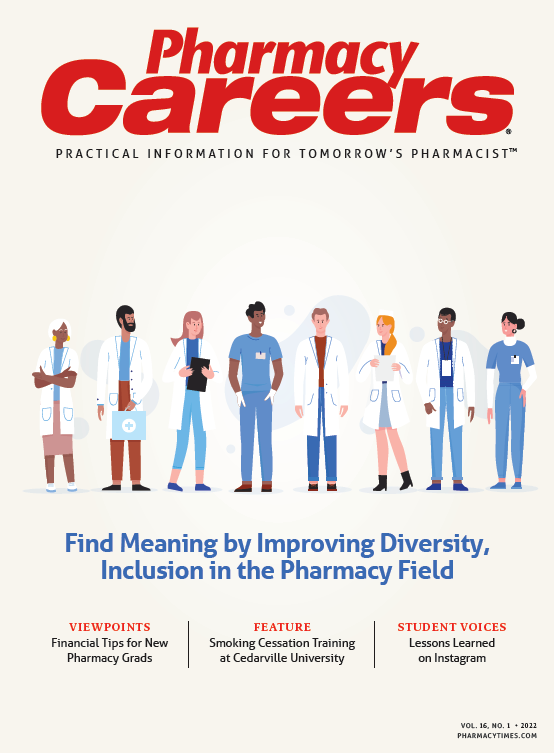Publication
Article
Pharmacy Careers
To Avoid Burnout, Take a Long-term Perspective on Mental Health
Author(s):
Owning your time and scheduling self check-ins can help students avoid burnout.
In the second episode of the Pharmacy Focus Podcast: Study Break, Jessica Louie, PharmD, CEO and founder of The Burnout Doctor Podcast, sat down with us to discuss how students can manage burnout. Although the words are often used interchangeably, there are key differences between them. Notably, stress is often the precursor to burnout, so managing the former can help prevent the latter.
Burnout is characterized by exhaustion, cynicism, and decreased self-efficacy, Louie explained. Exhaustion can be both emotional and physical and include chronic fatigue. Cynicism often follows exhaustion and can manifest as depersonalization or having a more negative perception of one’s work. Feeling disconnected from colleagues or patients can be a sign of cynicism. In the final stage of burnout, as self-efficacy decreases, individuals have a low sense of personal accomplishment and can begin to question whether they really have an impact on their workplace or their patients.
People under stress, on the other hand, typically appear to be overly engaged (hyperactive), but as burnout begins to set in, they tend to become more disengaged (hypoactive). Despite stress and burnout being so common, many students and pharmacists are unaware of the differences between the two, Louie pointed out. “Burnout is definitely something that I was not familiar with...back when I was a student or a new pharmacist,” she said. “I actually experienced burnout...in 2014 and 2015.”
Burnout can also have a significant impact on mental health more broadly, and Louie urged students who may be struggling emotionally to seek appropriate care from a licensed practitioner. Mental health and well-being go hand-in-hand, she said, and students in particular should remember that education is not the only part of their lives that is important. Allowing one’s identity to
be attached to a single thing, like school, can quickly lead to burnout if students stop paying attention to their health, the time they spend with friends, and other meaningful experiences.
To maintain a balance between various responsibilities, Louie recommends that students do a “joy check” every week to make sure their physical, social, educational, spiritual, and other needs are being met. “We want to feel aligned, so that we don’t feel that school or work is our whole life,” she said.
This balancing act can be especially challeng- ing for students, who may be involved in academic and professional organizations as well as being subject to the daily stress that coursework and their personal lives can generate. Louie urges students to block off periods of time for different activities on a planner. This way they can be in control, instead of merely reacting to external demands and running from one activity to the other.
Similarly, setting boundaries can be especially important when students are juggling professional and personal responsibilities. Although some are unavoidable, anything that students agree to do should bring joy and add value to their lives, Louie emphasized.
Finally, when feeling burned out everyone should take a CEO day—a day that is dedicated solely to tasks that will move them forward per- sonally and professionally. During that day, stu- dents can think about the goals they want to set for themselves and plan how to attain them.
“So, if you’re a first-year and you’re thinking about setting goals over the next 3 years, or if you’re a fourth-year and you’re thinking about setting goals over the next couple of years, you can start brainstorming that out for yourself,” Louie said. “And then once you have goals...you can start breaking them down into how you’re going to get something in 3 years by breaking it down into a yearly goal, and then reverse engineer it into a quarterly goal.”
This approach can help students prepare for the future without becoming overwhelmed by the big picture. Not all goals should be pursued simultaneously, and it can be helpful to acknowledge that some may be more pressing at different points in time. For example, employment may be more important than schoolwork during the break between semesters, whereas academics will take priority during the semester.
Louie added that burnout is most likely to occur during transitions in life, such as between graduating and becoming a full-time pharmacy employee. Although students may not always be in control of these transitions, they do
have control over whether to add stressors to any given situation.
“Maybe that means that if you just graduated and you’re starting a new job, you don’t also add taking additional board exams at the same time, or making a big purchase at the same time,” Louie said. “You push those off a couple of months so that you’re able to focus on that one transition, instead of having 2 or 3 or 4 transitions going on at the exact same time.”
Finally, pharmacy students should consider mental health care as an investment in themselves. Blocking time off every day or every week to unwind and check in with yourself can be effective and writing this on the calendar can help turn it into a routine.
“I just encourage students to make some time for this and invest in yourself, whether that’s putting 5 minutes on your calendar or putting 30 minutes in your calendar,” Louie said. “Take some time for yourself and don’t break that appointment once it’s on your calendar.”

Newsletter
Stay informed on drug updates, treatment guidelines, and pharmacy practice trends—subscribe to Pharmacy Times for weekly clinical insights.






